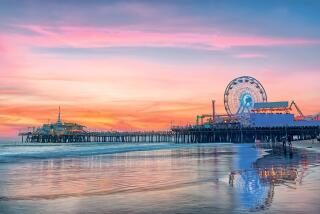Racist Incidents Spark Debate on City Image
In the wake of last weekend’s near-riot sparked by a white supremacist meeting Sunday in Glendale--the second such street fracas this year--city officials are vehemently denying the city is a haven for racists.
But civil rights leaders say the city has a racist image--in part because of official inaction--that invites white supremacists to Glendale.
The issue was raised by a comment made before Sunday’s meeting, led by avowed racist and convicted church-bomber J. B. Stoner. When asked by a reporter why he chose to speak in Glendale, Stoner replied: “All white people here in Glendale love me, except for a few soreheads.”
That remark drew quick denials and sharp criticism this week from city officials.
“He has no support in this community,” Glendale Mayor Ginger Bremberg said of Stoner, a resident of Marietta, Ga. “The poor old fool is suffering from being in prison too long and being a hatemonger too long . . . There may have been a few Glendalians there, but they would go to see a two-headed geek in the circus, too.”
Even before Sunday’s meeting, city officials attempted to rebut any suggestion that Glendale tolerates racism.
“We don’t like them, we don’t want them and we don’t intend for their activities to get out of hand in this community,” City Manager James M. Rez said in a statement before Sunday’s demonstration.
But some civil rights activists dismissed the statement as mere rhetoric.
“Public officials have to give more than just lip service.” said Raymond Johnson Jr., president of the NAACP in Los Angeles. “They need to develop a long-range five-year plan . . . the city of Glendale has not opened its arms to all minorities.”
Ray Reyes, longtime civil rights activist and director of a counseling office for low-income and minority students at Glendale Community College, has urged similar proposals for the city.
He said racist groups are attracted to Glendale because its government structures “have not demonstrated that they’re not practicing racism of their own--not overt racism, but institutionalized racism.”
Johnson and Reyes contend that Glendale’s image of racism contributed to Sunday’s demonstration, in which a mob of more than 250 angry protesters gathered outside the Glendale Holiday Inn chanting slogans and shouting at the more than 75 police officers who blocked their way into the hotel meeting.
Irv Rubin, leader of the Los Angeles-based Jewish Defense League, suggested that Glendale’s well-publicized racist past may signal a welcome to white supremacist organizations.
“Tragically, Glendale, a quiet community, has had a history of harboring racists over the past decades,” Rubin said during the demonstration Sunday. “ . . . but is racism institutionalized here? Is it hard-core? I don’t know. I can’t put my finger on it.”
During the mid-1960s, Glendale was home to the West Coast Headquarters of the American Nazi Party. During the 1920s, The Ku Klux Klan was active in Glendale. And last January, Pace Amendment Advocates, which proposes deportation of all U.S. residents not of western European background, set up its national headquarters in Glendale. The organization espouses a philosophy that racial integration has caused the the United States to decline morally and ethically.
“What is it about this town that encourages groups like these to be here?” Reyes asked. “That is the central issue.”
Reyes said he hoped to answer that question last June 25 with a forum at the public libarary between Pace Advocate Amendment spokesman Daniel Johnson and a member of a civil rights group he led. However, the highly publicized event erupted into violence among white supremacists and opposing groups. The forum was cancelled by Reyes before it could begin.
Event ‘a Fiasco’
Angry city officials labeled the nationally publicized event “a fiasco” and said it disgraced Glendale. Reyes, in turn, accused city officials of trying to ignore racism.
Bremberg this week rejected the contention of racism within the city government but said she is uncertain as to why Stoner, Johnson and others are attracted to Glendale.
“Because Glendale is easy on, easy off, easy to get directions on the freeway? I don’t know,” Bremberg said.
Pace spokesman Johnson said in an interview this week that his organization moved to Glendale only because of its centralized location.
“We didn’t come here because of any reputation Glendale had,” he said.
NAACP president Johnson said city officials should create a human-relations committee and invite Asians, blacks and other minority groups to address racial issues in Glendale.
“Probably 95% of the citizens are a fine type--the kind I would want for my neighbors,” Johnson said of Glendale citizens. “But there are more racial sympathizers in Glendale than in other places . . . at some point and time the citizens have to force Glendale public officials to place the issue of racial unrest as a priority.”
Johnson cited a June 10 incident in which a 45-year-old white Glendale man taped a racially derogatory note to the apartment door of a black Glendale woman and a June 15 incident involving a white Glendale teen-ager who attacked a visiting black Burbank man after calling him a “nigger” as examples of racial unrest in Glendale.
Reyes cited as an example of institutional racism the city’s appeal of an October, 1986, federal court ruling that found the Glendale Police Department had discriminated against a Latino officer by passing him up for promotion in favor of less-qualified Anglo officers.
Before a recent Glendale City Council meeting, Reyes offered city officials a plan to increase the number of minorities in management-level positions that he said would prove officials don’t embrace racism.
But Bremberg and other city officials deny that any form of racism exists in Glendale any more than it exists in other cities throughout the country.
“It’s obvious there are people in Glendale who are on the lunatic fringe--racists, tyrants and would be dictators,” Bremberg said. “You’ve got dumb bunches all over the world.”
JOHN FUNG / Los Angeles Times
More to Read
Sign up for Essential California
The most important California stories and recommendations in your inbox every morning.
You may occasionally receive promotional content from the Los Angeles Times.










